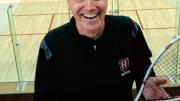As a young man in Nottingham, England (“Robin Hood country”), Mike Way was obsessed with two stringed instruments: the squash racquet and the classical guitar. Now, at age 56, he plays guitar rarely and, he says, “badly,” but he has become one of the world’s top squash coaches. This fall he took over Harvard’s program. As an athlete, “I did everything wrong that you could possibly do wrong,” he recalls, then adds, grinning, “That stood me in good stead as a coach.” In his twenties he became the fourteenth-ranked player in England, and rose as high as number five in Canada, where he moved in 1981 to accept a six-month coaching job at a Toronto club. He stuck around, becoming head pro at venues like the Toronto Racquet Club, home of Canada’s National Squash Training Centre, which he helped found in the 1990s. “If I’m going to be a coach, why not be a bloody good one?” he thought. “I was like a sponge--I learned from anyone and everyone.” Way’s way is to distill the common elements from the games of top pro players. He strives for “depth” in coaching--the duration of ball contact with strings, the feel and sound of a shot. He developed a raft of Canadian juniors and coached Jonathon Power, who became squash’s world champion in 1998. Way also loves working with coaches and has produced four coaching DVDs. For years, college squash’s juggernaut has been Trinity College, where recruiting and admissions policies, and other guidelines, differ drastically from the Ivy League’s. “We need to accept that, recruit the best we can, and help our athletes develop their squash games,” says Way. (His significant other, Beth Zeitlin, an assistant squash coach, trains the squads in fitness.) Though he claims kiteboarding as his sole addiction, teaching might be another: “If you’re an interested player, I’m there with bells on.”
Profile of new Harvard squash coach Mike Way
Profile of new Harvard squash coach Mike Way
A new squash coach has arrived from Canada.

You might also like
Harvard Students, Alumni to Compete at the 2026 Olympics
Six Crimson athletes are headed to the XXV Winter Games in Milano Cortina.
Introductions: Dan Cnossen
A conversation with the former Navy SEAL and gold-medal-winning Paralympic skier
England’s First Sports Megastar
A collection of illustrations capture a boxer’s triumphant moment.
Most popular
Explore More From Current Issue

Rabbi, Drag Queen, Film Star
Sabbath Queen, a new documentary, follows one man’s quest to make Judaism more expansive.

How Stories Help Us Cope with Climate Change
The growing genre of climate fiction offers a way to process reality—and our anxieties.






